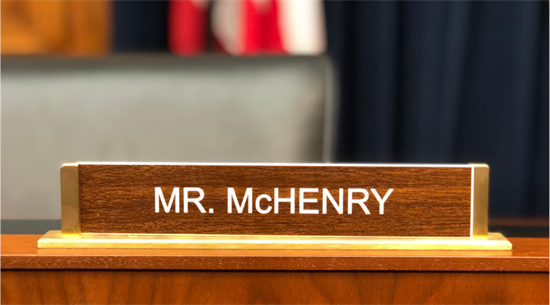Republicans Press Zuckerberg on Facebook’s Financial Innovation Outlook
Washington,
October 24, 2019
Today, the House Financial Services Committee held a hearing entitled, An Examination of Facebook and Its Impact on the Financial Services and Housing Sectors, in which members had the opportunity to discuss the future of Project Libra with Facebook CEO, Mark Zuckerberg. Throughout the hearing, Committee Republicans thoughtfully discussed the outlook and potential hurdles for the development of new financial technologies like the Libra project. However, Committee Democrats took advantage of the opportunity to press Zuckerberg on politically-charged topics rather than focusing on what is driving financial innovation away from the United States and how to modernize government regulation to support innovators. On American Competitiveness: Ranking Member Patrick McHenry (NC-10): “Why are we seeing emerging technologies, driven by blockchain projects and digital currencies, being developed elsewhere, such as the case of Libra?” Zuckerberg: “Congressman, we have a lot of competition around the world, and you’re right, over the last decade pretty much all of the major internet platforms have been American companies with strong free expression values, and I just think that there is no guarantee that that is the state of the world going forward. Today 6 of the top 10 companies are coming out of China, and certainly do not share our values on things like expression.” On Libra’s Compliance with U.S. Federal Regulators: Subcommittee on Investor Protection, Entrepreneurship, and Capital Markets Ranking Member Bill Huizenga (MI-2): “You said that you won’t launch without U.S. regulator’s approval. What happens if the (Libra) association decides to launch despite that?” Zuckerberg: “Congressman, then I believe we would be forced to leave the association. I would hope that the association will weigh our recommendation, and what we say publicly that we think should happen, but if at the end of the day we don’t receive the clearances that we feel like we need to move forward, and the association chooses to move forward without us, then we will be in a position where we will not be a part of the association.” On the importance of American innovation: Subcommittee on Oversight and Investigations Ranking Member Andy Barr (KY-6): “Criticism is cheap, anybody can criticize. As you can see here today politicians in Washington are pretty good at lodging criticism. But creating something of value is significantly more difficult and I would commend you for being an innovator and trying to create something of value. It seems like in Washington, whenever the private sector produces some type of innovation or new advancement, politicians and bureaucrats rush in to criticize or regulate. In an era when some politicians in Washington, and even some politicians on this committee, are openly embracing socialism and central planning, it seems like the presumption is always that private sector innovation is a bad thing. I think that presumption should be reversed. We in Congress should view innovation for its potential opportunities in promoting financial inclusion, reducing friction in transactions, aiding small business and bringing the financial system to unbanked and underbanked communities. That’s not to say we shouldn’t ask questions, which is of course what we’re doing here today. But in America, a country built on free enterprise and capitalism, it’s always better to be on the side of innovation.” On balancing emerging technology with consumer protections: Congressman Warren Davidson (OH-8): “Listening to how some of my colleagues have addressed you, I suspect you may actually envy whomever Satoshi Nakamoto is, because he’s very anonymous. It’s hard to subpoena Satoshi Nakamoto or ridicule him, but then again, no more control over bitcoin, there’s no headquarters or anything else. So, he clearly made blockchain synonymous with bitcoin early on, but blockchain itself and distributed ledger technology, I believe, is going to be substantially bigger, and I think that a lot of people took Facebook’s entry into this space as a sign that you and others view this as a much larger space for emerging technology. Could you tell us a little bit more about that?” Zuckerberg: “Sure. I think that there needs to be a number of approaches here. I think some of the innovation on cryptocurrencies and the decentralized nature of that can be very valuable, I just think that that is not what a big company like Facebook can add to the industry. Once we’re in the position that we’re in, we’re not going to create something that’s decentralized, that can’t hold up the highest standards of protecting against all of the risks that we’re talking about today whether it’s financial stability, or fighting terrorism, crime, or fraud. We want to work with regulators to make sure that we can build something that’s at that highest standard.” Learn more about today’s hearing HERE. |


